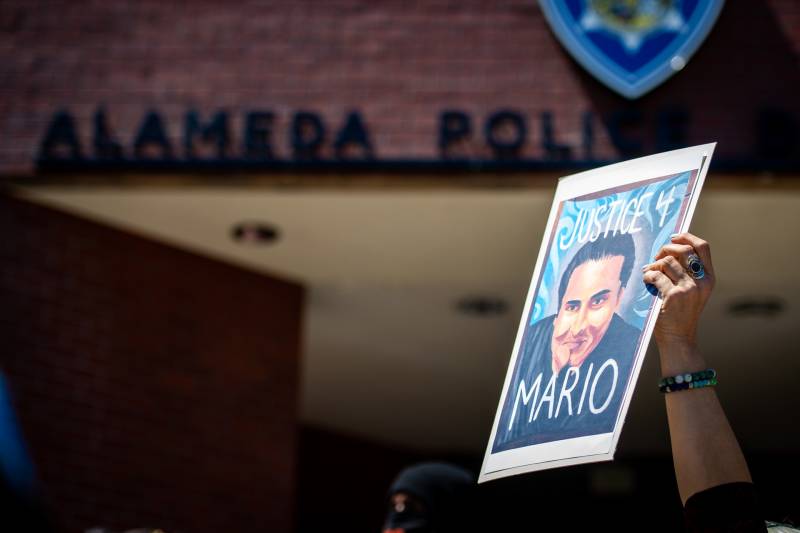“He seems like he’s tweaking. But he’s not doing anything wrong, he’s just scaring my wife,” the caller said.
The second caller reported the man lingering in the park on Oak and Powell streets and appearing to be trying to break store security tags off alcohol bottles.
As captured in the nearly hour-long bodycam video, the incident began calmly, but after the three officers’ made repeated, unsuccessful attempts to obtain Gonzalez’s full name or ID, they grabbed him, never saying he was under arrest. When Gonzalez resisted being handcuffed, the officers took him to the ground, pinning him on his stomach, with at least one pressing an elbow and knee into his back and shoulder. They handcuffed him, holding him down with his hands behind his back as he continued to struggle. After roughly five minutes, he appeared to go limp and stopped breathing.
After the officers performed CPR and administered at least two doses of Narcan — given to counteract opiate overdoses — Gonzalez was rushed by paramedics to Alameda Hospital and pronounced dead at 11:45 a.m., according to the autopsy report.
Gonzalez’s death, which sparked community protests and calls for police reform, came a day before a jury in Minneapolis convicted former police officer Derek Chauvin of murder in the custody death of George Floyd.
In the autopsy report, released nearly eight months after the incident, the Alameda County Coroner’s Bureau classified Gonzalez’s death as a homicide. However, it said he died from cardiac arrest, and listed the “the toxic effects of methamphetamine” as the leading cause. The report also noted several contributing health factors, including morbid obesity, alcoholism and an enlarged heart.
The meth could have led to a fatal cardiac arrhythmia and the stress of struggling and being detained by police could have put overwhelming strain on his heart, the autopsy report concluded.
The DA’s review found the officers acted reasonably out of concern that Gonzalez might pose a threat to them, himself and others. It said they tried to “deescalate” the situation by using “necessary” force, but never struck Gonzalez or used any illicit chokeholds or weapons.
Following the announcement, Alison Berry Wilkinson, the officers’ attorney, praised the decision. “The officers are grateful the district attorney recognized that this tragic death was an unintended consequence of their legitimate and lawful actions,” she said in a statement.
Michael Haddad, an attorney representing Gonzalez’s 5-year-old son in an ongoing civil rights lawsuit, called the decision disappointing but hardly surprising. “[District Attorney] Nancy O’Malley has a long history of not holding police accountable, even when they act unlawfully,” he said. “They used criminal excessive force that caused a homicide.”
The two federal civil rights lawsuits filed on behalf of Gonzalez’s mother and son both allege the officers improperly escalated the confrontation with Gonzalez, who appeared “disoriented and confused,” but was not acting in a threatening manner. The suits accuse the officers of using improper restraint against Gonzalez in a way that asphyxiated him, and ignoring clear signs that he was struggling to breathe.
“We still intend to hold the officers fully accountable for killing our client Mario Gonzalez Cortez’s father,” Haddad said.
The officers, he said, should have known better than to place weight on Gonzalez’s back while restraining him in a prone position for an extended period of time, a hold that can block the flow of oxygen to the lungs, particularly for someone with a preexisting medical condition.
“The police have been trained about this for more than 30 years now,” he said, noting that regardless of Gonzalez’s health conditions, he would still be alive if officers hadn’t restrained him in that way.
“They had ruled out all crimes, including theft,” Haddad added. “No harm would have been done by simply walking away and leaving Mario to mind his own business in the park as he had been doing.”
In its report, the district attorney’s office noted that it didn’t consider whether the officers may have violated Alameda Police Department policy or used improper but noncriminal tactics.
“Those issues are sometimes determined by a civil action” where the standard of proof is lower than for criminal cases, the report said.
This post includes reporting from KQED’s Sukey Lewis and Matthew Green, and from The Associated Press.

